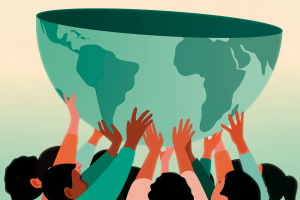The University of Washington School of Public Health’s Alison Wiyeh, MD, MSc (PhD student in the Department of Epidemiology with a concentration in public policy and management) and Ferdinand Mukumbang, PhD, MS (Assistant Professor in the Department of Global Health) recently published a correspondence in The Lancet, “Global South leaders should strengthen strategic capacity“. The commentary describes the limitations of relying on Global North allyship in the decolonization of global health.
Wiyeh and Mukumbang’s argument is particularly salient following current U.S. president Donald Trump’s actions of freezing foreign assistance, withdrawing from the World Health Organization, and suspending U.S. refugee resettlement. These unilateral decisions demonstrate the fragility of Global North allyship and reinforce the urgency of building autonomous Global South leadership for sustainable decolonization.
With permission, their commentary is copied below:
Madhukar Pai and colleagues1 highlight the need for Global North institutions to assume an allyship position in the decolonisation of global health. Pai and colleagues’ vision, anchored in principles of equity and justice, presents an ideal of what global health could become. However, expecting authentic allyship from Global North institutions that stand to lose their control of resources and influence in the wake of true decolonisation, is akin to asking the coloniser to become an ally in the struggle for the freedom of the colonised. This analogy shows a fundamental paradox in their argument.The call for Global South-led leadership in global health is timely, yet it omits the crucial need for capacity building in the governance, business, politics, and economics of global health.2Sustainable decolonisation requires empowered Global South leaders who can effectively navigate the interdisciplinary complexities of the global health landscape and use available governance tools to protect national autonomy and advance prioritised health outcomes for their nations, extending beyond technical public and global health skills. Strengthening Global South leader capacities enables them to negotiate favourable terms with external partners and allows for the prioritisation of local development goals. Unfortunately, current global health training programmes are often inadequate, leaving future leaders ill-equipped to confront entrenched power structures.2Global health praxis urgently needs models that prioritise autonomy and self-determination. Without these models, we risk perpetuating cycles of critical commentary that are important for raising awareness, yet yield only incremental change when transformative progress is desperately needed.3
References
- Pai M, Bandara S, Kyobutungi C. Shifting power in global health will require leadership by the Global South and allyship by the Global North. The Lancet [Internet]. 2024 Oct [cited 2024 Oct 29];0(0). Available from: http://www.thelancet.com/article/S0140673624023237/fulltext
- Withers M, Lin HH, Schmidt T, Delos Trinos JPCR, Kumar S. Establishing Competencies for a Global Health Workforce: Recommendations from the Association of Pacific Rim Universities. Ann Glob Health [Internet]. 2019 [cited 2024 Oct 29];85(1):47. Available from: https://pmc.ncbi.nlm.nih.gov/articles/PMC6634469/
- Abimbola S, Pai M. Will global health survive its decolonisation? The Lancet. 2020 Nov 21;396(10263):1627–8.
Image by Anna Parini from Foreign Policy.
